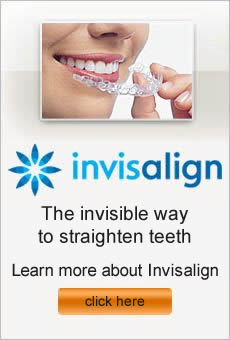It’s no secret that it’s more difficult to clean your teeth and gums while wearing braces. Food is easily trapped in the wires and between your teeth and brackets. This means it’s more challenging to keep your teeth from decaying while you have braces. Keep the following things in mind so that your teeth stay healthy during their transformation to a beautiful smile.
Brush properly
Follow your orthodontist’s instructions for brushing properly with braces. Use a soft toothbrush with fluoride toothpaste, and brush at a 45 degree angle. Clean every area of each tooth, and gently brush between the wires and your teeth. Also remember to floss every day to reach the areas that your toothbrush cannot access.
Use special cleaning tools
Look for special brushes, flossers, and other tools that can help clean your braces. Many of these are available in your drugstore, and ask your orthodontist for suggestions as well.
Choose approved foods
A proper diet will go a long way in protecting your teeth from decay. Sugary or starchy foods both cause more plaque, which can be hard to reach when brushing. Also, your orthodontist will give you a list of foods to avoid while wearing braces because they might damage your appliances or harm your teeth. For example, sticky foods like gum and caramel can easily get caught in your braces. Hard foods such as candy and nuts can damage your wires and brackets, and hard foods that you bite into like corn on the cob and apples are also risky.
Don’t forget your dentist
Even though you see your orthodontist regularly for appointments, don’t forget to continue with regular visits to your dentist for thorough cleanings.
Dr. Fotovat is an Orthodontist in Sherman Oaks California
In most cases, you have probably either had braces, need braces, or know someone with braces. When you need orthodontic treatment, you often receive a great deal of information. Having a basic knowledge about the world of orthodontics will help you make educated decisions for yourself or a loved one.
What is orthodontics?
Simply put, orthodontics is the dental specialty focused on the diagnosis, prevention, and treatment of dental or facial irregularities.
How is an orthodontist different from a dentist?
While all orthodontists are dentists, not all dentists are orthodontists. In addition to successfully completing dental school, orthodontists must also take another two to three years of advanced training.
Can I tell if braces are needed?
The best way to determine if you or a family member should seek orthodontic treatment is through an evaluation with an orthodontist. If you notice buck teeth, an overbite, under bite, or open bite, orthodontic treatment is a likely course of action.
What’s the difference between Phase I and Phase II?
With Phase I, or early interceptive treatment, patients are between 6 and 10 years old, and all their permanent teeth have not yet erupted. Certain problems are easier to treat when children are younger and they are still growing. Also called comprehensive treatment, Phase II happens once all permanent teeth come in and usually involves a full set of braces.
What are my treatment options?
That answer depends on your age and your specific case. Typically, younger children respond well to traditional metal braces. Older teens and adult patients often like less conspicuous choices. Ceramic brackets, clear aligners like Invisalign, and lingual braces can straighten your smile and allow you to maintain a professional image.
Find an Orthodontist in Sherman Oaks CA
For many people, enjoying the warm weather involves touch football, bike riding, or other summer activities. While it’s great to have a good time, you need to preserve your smile as you participate in the fun. Approximately 40 percent of all sports injuries involve the face. Wearing a mouth guard can ensure that you don’t hurt your teeth and gums if an accident occurs. In fact, a mouth guard can reduce the risk of concussion by 50 percent.
Who needs a mouth guard?
Anyone who is involved in sports that could result in contact should purchase a mouth guard, including soccer, hockey, football, and basketball. Even non-contact activities such as skateboarding, horseback riding, and mountain biking could result in injury to your face or mouth, so you may want to consider a mouth guard as well.
Can adults wear mouth guards?
Absolutely. Whether you play on the community softball team or just like to throw the football with the neighbors, you are never too old to protect your smile.
What are the options for a mouth guard?
If you decide to look into getting a mouth guard, you have several choices. Inexpensive and available at any sporting goods store, pre-made mouth guards can be bulky and may not fit correctly. Boil-and-bite mouth guards are designed to conform to your teeth after you place them in scalding, hot water. Most dentists and orthodontists recommend custom mouth guards, which are created from molds of your mouth. Custom mouth guards offer the best protection.
Can I wear a mouth guard with braces?
Yes. During orthodontic treatment, you still need to worry about your mouth if you play sports. Because of the braces, you will need to wear a non-fitted mouth guard so that the appliance doesn’t damage your orthodontia.
Mouth guard for braces – Orthodontist in Sherman Oaks CA
Obesity, defined as an excess proportion of body fat, has reached epidemic levels in the United States. This condition presents health risks to many areas of your body, and takes a toll on just about every aspect of your life. What does obesity have to do with oral health? Recent studies have linked the development of obesity with oral bacteria.
By testing the saliva of overweight people compared to individuals within a healthy weight range, researchers have discovered an oral bacteria present in 98 percent of the obese subjects. Experts believe this bacteria is an indicator of developing an overweight condition. Also, they suspect that the bacteria may participate in the body functions that lead to obesity.
Preventing and controlling obesity usually begins with analyzing and changing your diet. A high glycemic diet, which generally means a diet high in sugars, contributes to weight gain. It is also connected with your dental health, because sugars in your mouth are converted into plaque. If plaque accumulates on your teeth and gums, the risk increases for tooth decay and gum disease.
While it will likely benefit your waistline to reduce the amount of sugar consumed, doing so will reduce your risks for oral disease. Likewise, regular dental checkups, proper oral hygiene including brushing and flossing twice daily, and smart diet modifications will also lower your oral health risks. As experts continue to investigate the connection between your mouth and your overall health, following recommendations for caring for your mouth will likely decrease oral bacteria and possibly limit your risks of other health concerns such as obesity.
Dr. Fotovat is an Orthodontist in Sherman Oaks CA
If your orthodontist has told you that you need to wear rubber bands as part of your treatment, no need to panic! Many braces patients before you have worn them and lived through it. Maybe if you understand the reasons that rubber bands can help you achieve a beautiful smile, it will be easier for you to wear them faithfully. Let’s learn more about the reasons and benefits of wearing your elastics.
Alignment
The brackets and wires of your braces align your teeth, but rubber bands are used to move your bite into correct alignment. The tension of the elastic creates pressure on the bracket that it’s attached to, and can correct an overbite or underbite. The phase of treatment to correct your bite is often the longest part of the process, but using rubber bands will hasten the movement of your jaw.
Following directions
Be sure to follow your orthodontist’s instructions completely. Failing to wear them as directed can lengthen your treatment time and may negatively affect your results. Your full cooperation in wearing the rubber bands will create the best outcome in the least amount of time.
Getting used to rubber bands
It takes a few days to get used to putting in your rubber bands, but after some practice it becomes simple. It’s normal for your teeth and jaws to be sore for the first week or less of wearing elastics, but the best way to decrease that time is to wear them faithfully. If you wear them intermittently, your mouth will be constantly sore because they don’t have a chance to get used to the extra pressure.
Tips
Some orthodontists require you to wear rubber bands while eating, and others don’t. Most patients are required to wear the elastics while sleeping. Just make sure you follow your doctor’s treatment plan specific to you. Wear your rubber bands if you play sports, unless you are wearing a mouth guard. Finally, continue to practice good oral hygiene as your orthodontist has instructed.
Orthodontist in Burbank CA



